FY2018 Annual Report
Integrated Open Systems Unit
Professor Hiroaki Kitano
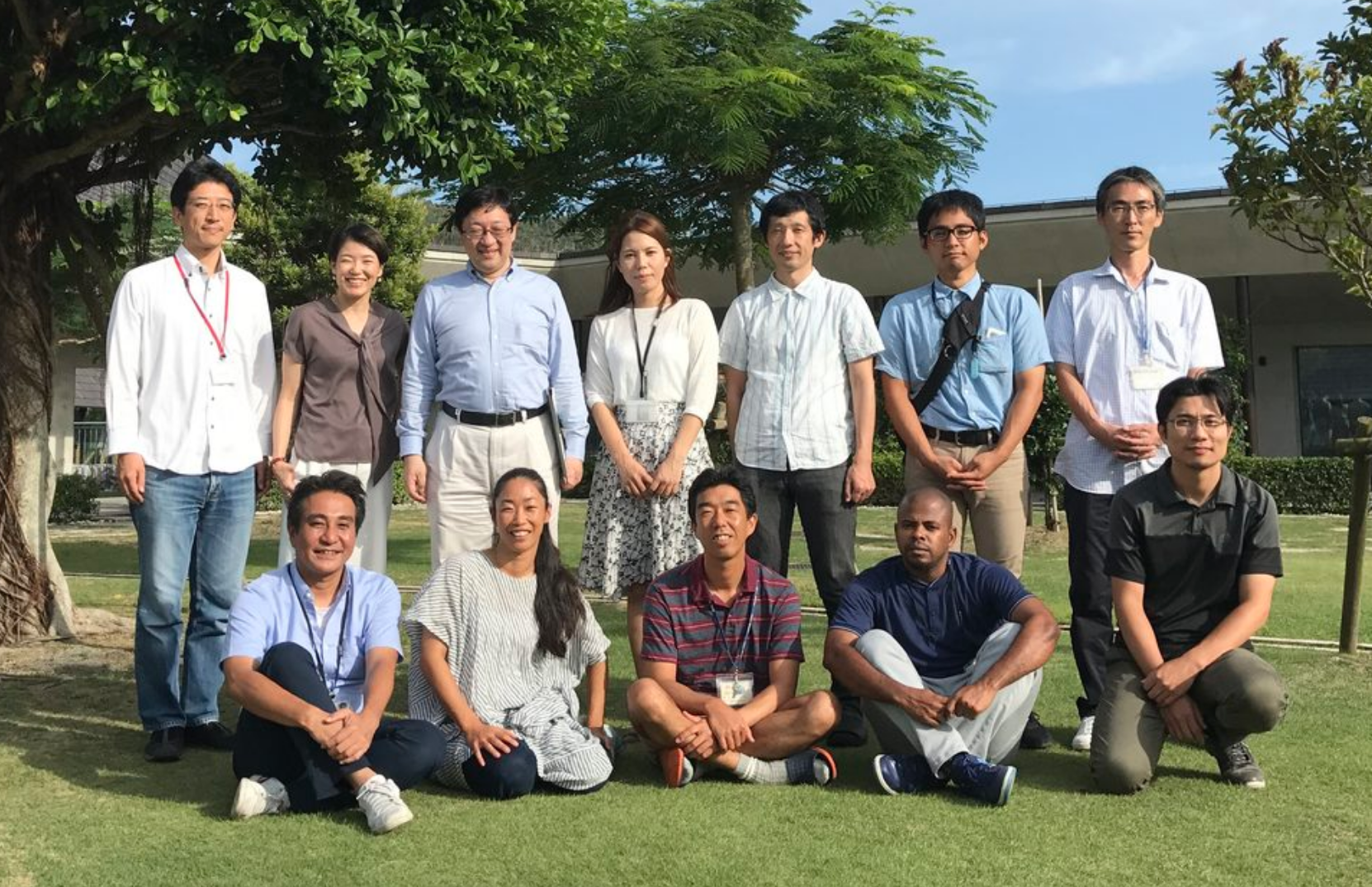
Abstract
FY2018 Integrated Open Systems Unit concentrated on the integration of the energy projects (1) Open Energy System (DC Microgrid with energy exchange), (2) Electric Vehicle with Exchangeable batteries and (3) sustainable living in Hot-Humid Regions, into one single interacting system and its evaluation.
The development of tools to support multilevel biophysiological modeling, simulation, and analyzing dynamical systems was transferred to Yamaguchi university, where a Prof. Asai and Dr Abe, previous members of the unit, continue their work as leaders of the Systems Bioinformatics Department.
1. Staff
- Dr. Kun-Yi Hsin, Staff Scientist (until July 2018)
- Dr. Yu Shimizu, Staff Scientist
- Taichiro Sakagami, Technical Staff (until August 2018)
- Kyota Kamiyoshi, Technical Staff
- Miwako Nishimura, Technical Staff (until August 2018)
- Kenichiro Arakaki, Temp Staff
- Ken Kuwae, Temp Staff
- Midori Tanahara, Administrative Assistant
2. Collaborations
2.1 Distributed Direct Current Open Energy System (DCOES) POC
- Description: Implementation and Evaluation of a DC microgrid with energy sharing features
- Type of collaboration: Joint research
- Researchers:
- Researchers from Sony Computer Science Laboratories
2.2 Nanogrid system for EVs with exchangeable batteries
- Description: Development of a microgrid connected charging station for EVs with exchangeable batteries
- Type of collaboration: Joint research
- Researchers:
- Researchers from PUES
2.3 Sustainable Living Home
- Description: Development of energy efficient technologies for homes in hot and humid regions
- Type of collaboration: Joint research
- Researchers:
- Researchers of Misawa Home
2.4 Sustainable Smart Greenhouse
- Description: Construction of a low cost intelligent infrastructure for green houses based on sustainable energy and wireless sensornetworks
- Type of collaboration: Joint research
- Researchers:
- Prof. Shiro Tamaki, Ryukyu Universities
- Yasushi Shiroma, PhD student, Ryukyu Universities
2.5 Remote and autonomous driving of a Neighborhood Electric Vehicle
- Type of collaboration: Joint research
- Researchers:
- Researchers from Sony Mobile
2.6 Anonymization Platform
- Type of collaboration: Joint research
- Researchers:
- Medical Doctors from Chubu Hospital, Okinawa
- Prof Yoshiyuki Asai, Yamaguchi University
3. Activities and Findings
Sustainable Living Architecture (SLA)

3.1 Open Energy System (supported by an Okinawa prefecture grant)
System Improvements and Simulator
In collaboration with Sony Computer Science Laboratories and Okinawan Electric companies the energy exchange mechanism between the 19 houses in the DC microgrid was expanded to enable energy exchange between multiple participants.
As change of system constellation is pricey and time consuming, but a necessity to advance investigations, a DCOES simulator was implemented, where grid infrastructure hardware such as PV panel and battery size and number of houses in the grid can be chosen and combined freely. Sharing preferences can be set for each house as well as consumption patterns (day peak, night peak etc). Alternatively existing data can be uploaded. The simulator reports efficiency of the chosen microgrid with respect to consumed energy covered by sustainable energy.
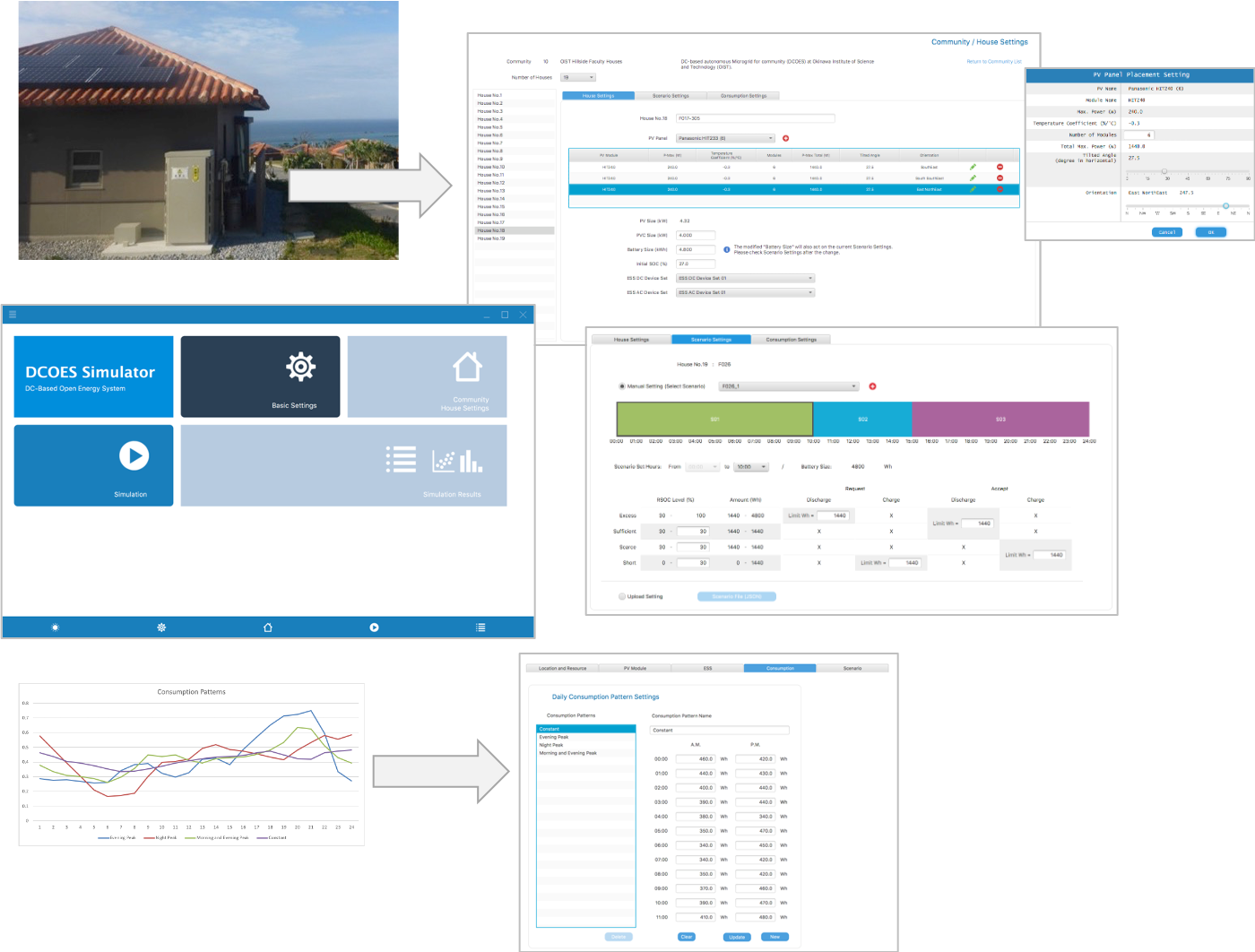
DCOES Simulator

Energy Exchange Mechanisms
For the purpose of moving to more dynamic the energy exchange algorithms, consumption and production data collected from the 19 houses was used to implement machine learning algorithms that can predict weather dependend energy production and consumption. We also invited researchers from the Netherlands Organisation for Applied Scientif Research for a workshop to exchange field work experience and discuss their approaches to distributed energy, in specific the implementation of their algorithm referred to as PowerMatcher. In the following, an emulator based on raspberry pies was implemented, which receives production and consumption data from the microgrid on campus in real time and enables visualization of the change of energy distribution with change of sharing strategy, in real time.
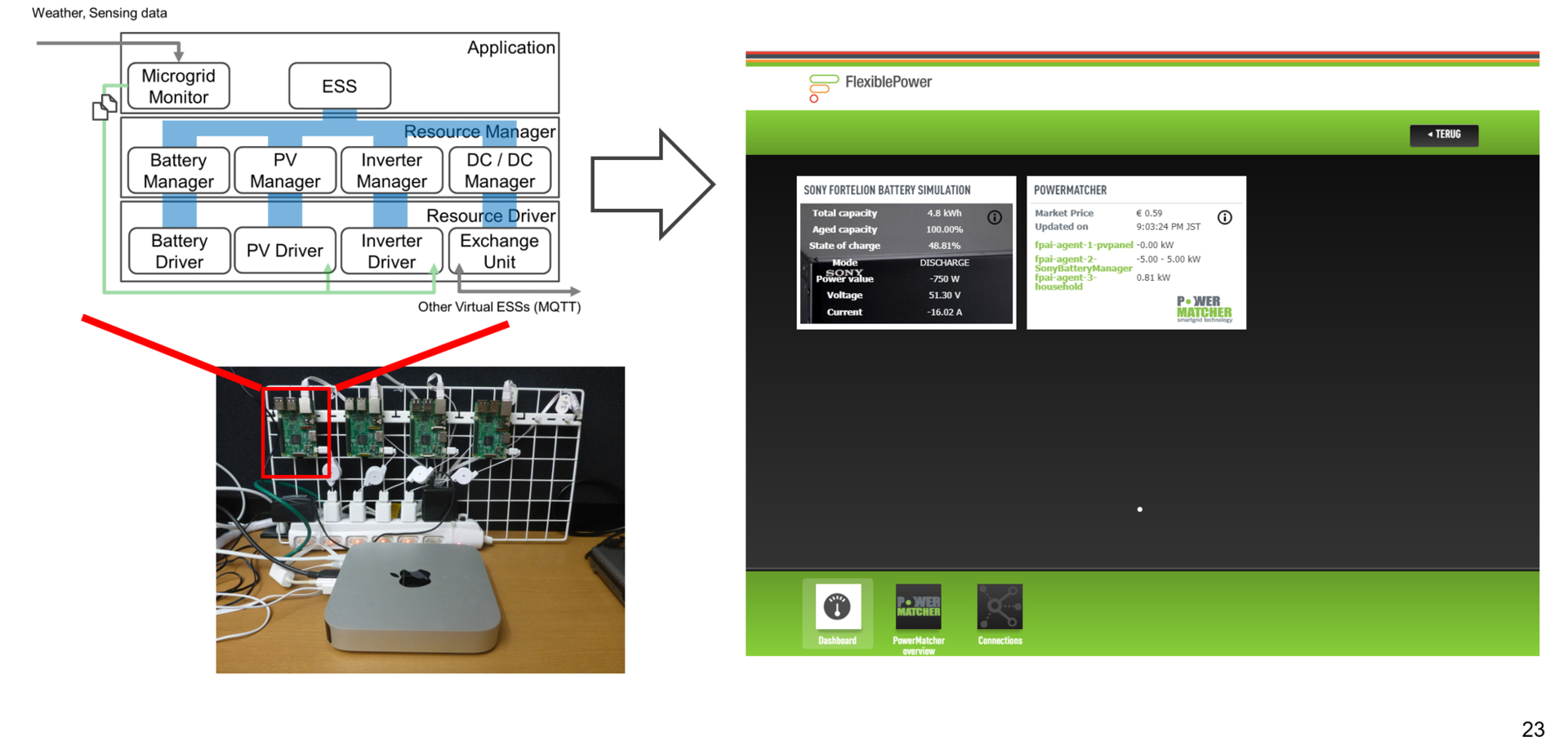
3.2 Microgrid with Exchangeable batteries (MIGEX)
The EV battery solar charging station and experimental setup for connection with the Electric Server System (ESS), which is part of every house in the DC microgrid, were moved from the Clayfactory to the Lab 1 parking. The solar panels were built into a carport under which the two ESS server and the swapstation (~PV charger for charging station) were rebuilt and a designated charging station installed.
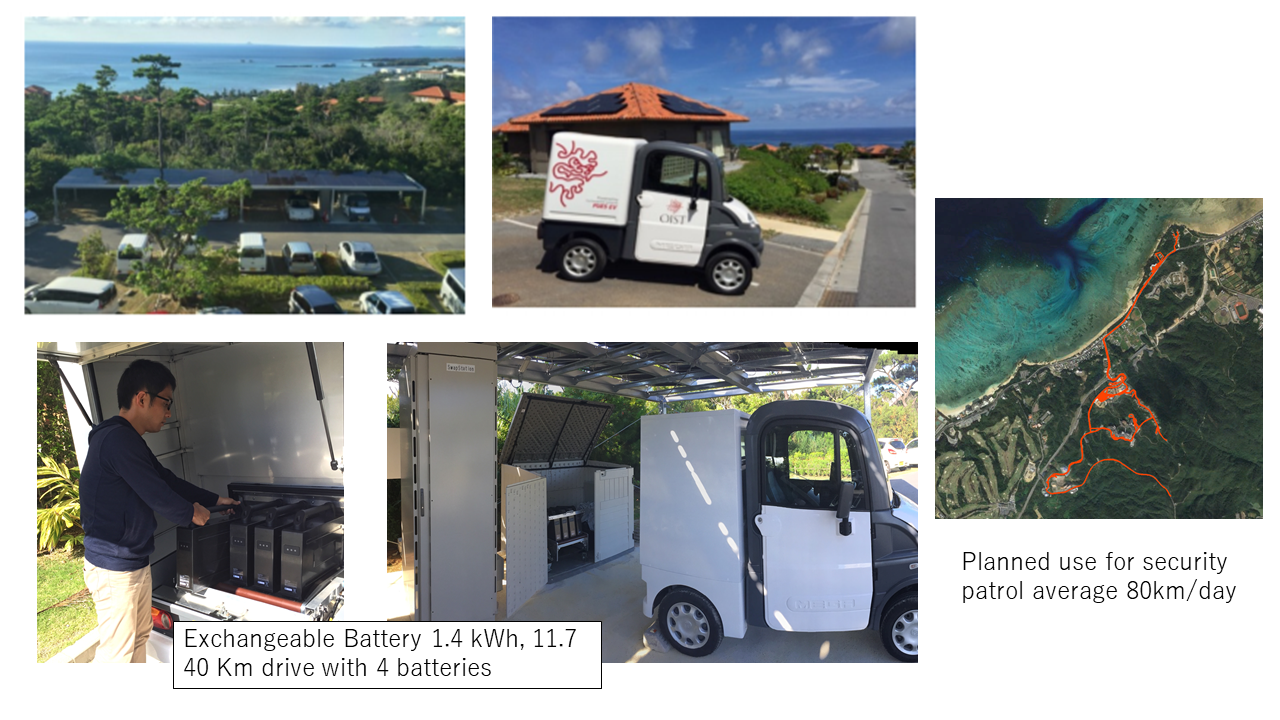
Under the aforementioned OPG project, we developed a software interface between the DCOES and EV charging station components, so that energy exchange between the grid and the EV batteries is enabled. This connection is part of a bigger vision of a smart sharing economy, where energy sharing through electric vehicles is the key. Through them, people as well as energy can be transported to the location of need (locations without infrastucture, disaster striken zones) and sustainable energy usage increased. To evaluate effectiveness of the latter we collected data from actual vehicles driving through the campus and estimated their energy consumption. This data will be used to simulate Vehicle to House (V2H) scenarios.
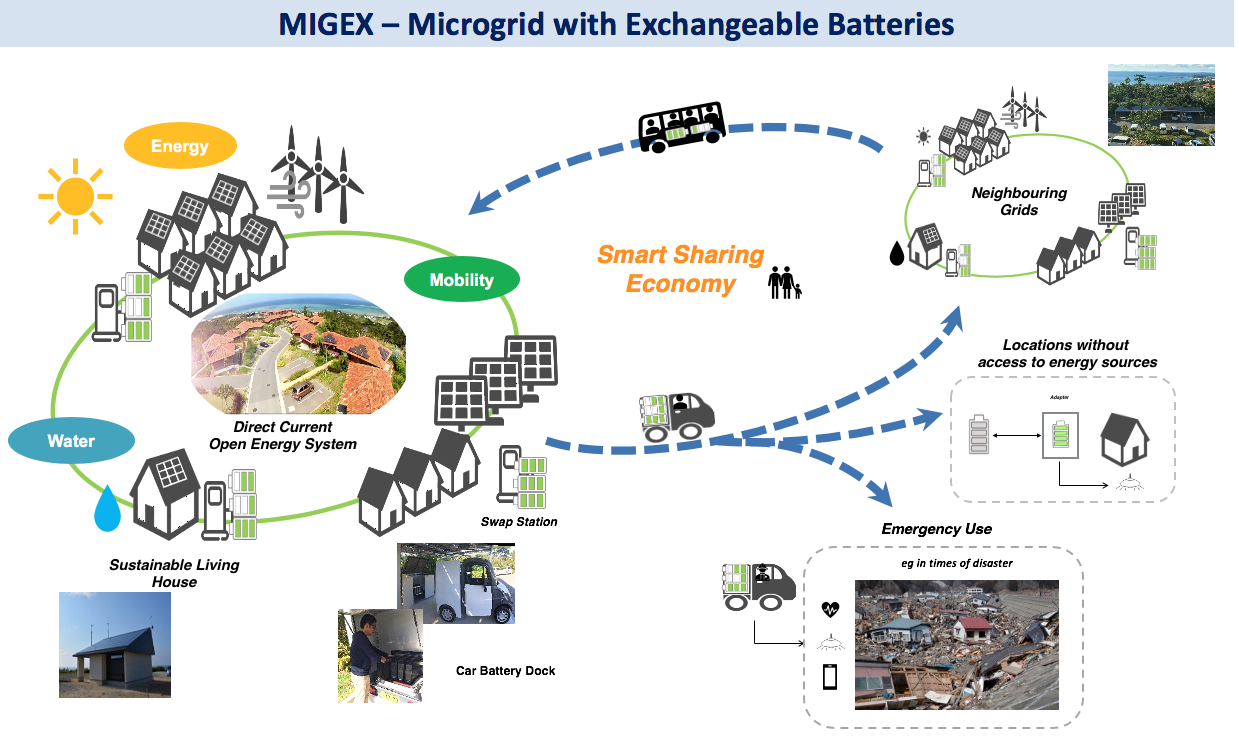
SLA Campus Tours and Presentations
- Institute of Electrical Engineers Japan (June 23rd, 14 visitors from Japan wide electric companies and universities)
- Shinenergy (June 28th, 2 visitors)
- Maeda Corporation (Oct 16th, 6 visitors)
- New Scientist (Nov 13th, 2 visitors)
- Okinawa Electric company, Aeon energy research group (Nov 20th, 22 visitors)
- Ene Coop (Feb 8th, 8 visitors)
- Nissin Electric and Trans Engineering Partners (March 26th, 4 visitors)
3.3 Sustainable living in the Hot-Humid Region
This project aims to provide the highest quality of life in remote areas that lack basic infrastructure (water, energy, etc.). Based on data collected from the experimental house built in collaboration with Misawa R&D, an online monitoring system was implemented to observe PV and wind turbine energy production, energy consumption and efficiency of the Cascade Solar system under different weather conditions in real time. A water purifying system was installed in order to reuse the rain water collected in a tank under the house.
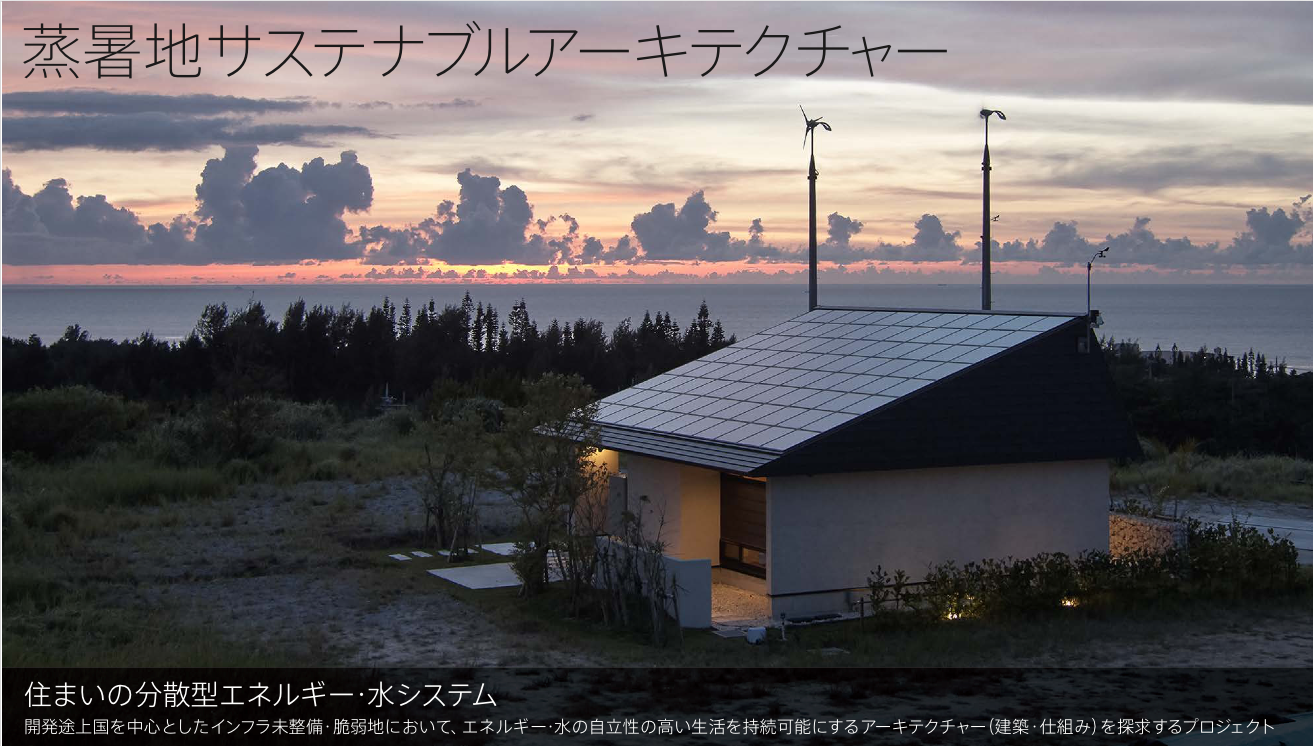
Sustainable Living Home, Research Home at OIST campus (in collaboration with Misawa)
3.4 Remote and Autonomous Driving
Drive PX was set up and mounted on a golf cart in preparation for remote and autonomous driving. At the same time the EV was set up to collect driving data on campus. Meanwhile researcher from Sony Mobile collected data with their own customized golf car, which will be used to test machine learning algorithms for autonomous driving. The vision is to use autonomous EVs with automated battery exchange stations for "mobile grid connectivity and energy sharing".
3.5 Sustainable Smart Greenhouse
Greenhouse climate conditions need careful control to ensure optimal plant growth. Aim is to construct of a cost intelligent infrastructure that can be operated on sustainable energy alone and automatically adjusts parameters such as watering and shading to changing weather and growth conditions. In collaboration with the universities of Ryukyus, we have accumulated the necessary paramters that need to be controlled in a green house for mango trees and have started to build individual sensors and design communication ways between the sensors.
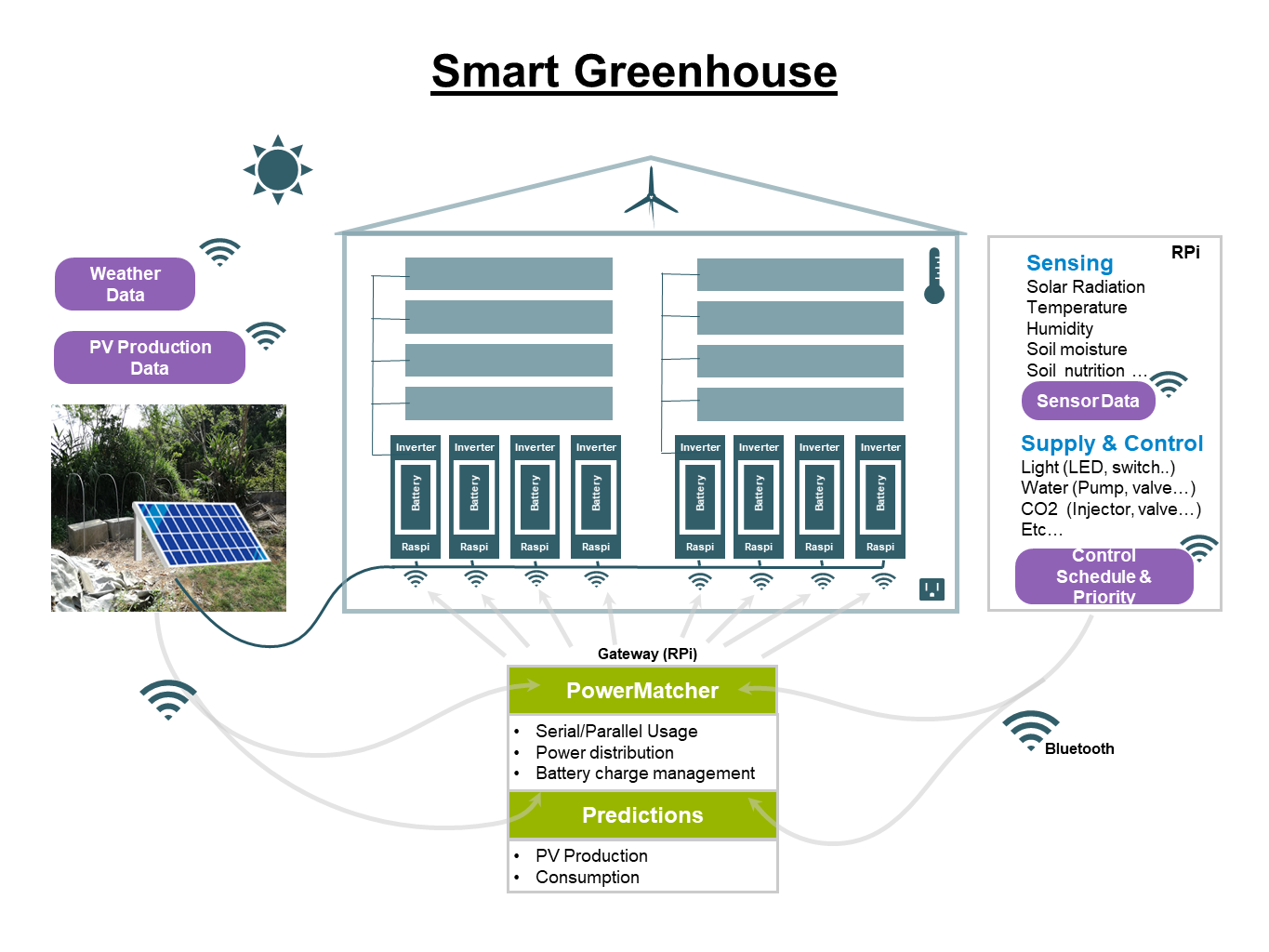
3.6 Privacy Preserving Real-Time Data Analysis Platform
FY2018 saw the finalization of our POC project concerning the implementation of a software that allows for transfer of medical data from a medical institution to a research facility without the need of unlikable anonymization procedures. Due to privacy concerns the latter prevent feedback of anomalies in patients in the analysed datatset, the core of the software is based on a novel data management architecture that virtually mirrors analysis and final query sequence from anonymous database (in research institute) onto master database (in medical institution).
Needless to say, such data management tool is in high demand in domains beyond the medical, such as finance, home activity monitoring, assisted driving and other IoT services, where advanced analysis of individual data are central to the service and yet privacy protection is critical. The final version is being tested for bugs and prepared for installation in Okinawa Chubu Central Hospital to allow for demonstration of the software in real environment.

Proof of Concept: Anonymization software for sensitive data. The identity of the patients is at no point revealed to the research institution. The hospital is able to identify at risk patients by applying models received from the research center as query to the original data set.
4. Publications
4.1 Journals
- Tokuda T, Yoshimoto J, Shimizu Y, Okada G, Takamura M, Okamoto Y, Yamawaki S, Doya K. Identification of depression subtypes and relevant brain regions using a data-driven approach. Scientific Reports 8,1808, http://doi.org/10.1038/s41598-018-32521-z (2018)
4.2 Books and other one-time publications
Nothing to report
4.3 Oral and Poster Presentations
[Oral Presentations]
- Y. Shimizu, Toward Probabilistic Diagnosis and Understanding of Depression Based on Functional MRI Data, Invited, Department of Systems Bioinformatics, Yamaguchi University, Feb 25 (2018)
- Kitano, H./北野宏明.AI-Driven Systems Biology. LINK-J UCSD Symposium on "Systems biology, bioinformatics and big data in medicine and drug development/LINK-J UCSDシンポジウム:医療と創薬におけるシステムズバイオロジー、バイオインフォマティクス、ビッグデータ, Nihonbashi Life Science Building, Tokyo/日本橋ライフサイエンスビル, 東京, Feb. 22, 2019.
- Kitano, H./北野宏明. Systems Biology for Kampo Medicine (Traditional Japanese Herbal Medicine)/システムバイオロジーと漢方. Tsumura 125thAnniversary Lecture/株式会社ツムラ創業125周年記念講演会, The Ritz-Carlton Osaka, Osaka/ザ・リッツカールトン大阪, 大阪, Feb. 2, 2019.
- Y. Shimizu, Toward Probabilistic Diagnosis and Understanding of Depression Based on Functional MRI Data, Invited, Faculty of Human Sciences, Waseda University, Dec 3rd (2018)
- Ken Kuwae, Integrated Network using MQTT, System/Smart Facility Joint Research Group (システム/スマートファシリティ合同研究会)IEEJ, Tokyo, Nov 6 (2018).
- Ken Kuwae, Kenichiro Arakaki, Yu Shimizu, Hiroaki Kitano, IoT based Virtual Environment for DC Microgrid Systems with Energy Exchange, International Conference On Smart Grid, Nagasaki, Dec 4-6 (2018).
- Kenichiro Arakaki, Ken Kuwae, Yu Shimizu, Hiroaki Kitano, A microgrid Simulation Software for DC-based Open Energy Systems - The DCOES simulator, International Conference On Smart Grid, Nagasaki, Dec 4-6 (2018).
- Yu Shimizu, Ken Kuwae, Kenichiro Arakaki, Hiroaki Kitano, Smart Grids and Stability - A Whole Year Evaluation of an Inhabited DC microgrid with Energy Exchange, International Conference On Smart Grid, Nagasaki, Dec 4-6 (2018).
- Kitano, H./北野宏明. Systems Biology for Kampo Medicine (Traditional Japanese Herbal Medicine)/システムバイオロジーと漢方. Tsumura 125thAnniversary Lecture/株式会社ツムラ創業125周年記念講演会, Keio Plaza Hotel, Tokyo/京王プラザホテル, 東京, Sep. 1, 2018.
- Kitano, H./北野宏明. AI driven system medical science perspective/AI駆動型システム医科学の展望. The 2nd Symposium “New Challenge to Refractory Disease by Artificial Intelligence and System Medicine”/第2回シンポジウム「人工知能・システム医学による難治性疾患への新たな挑戦」, KKR Yamaguchi Asakura, Yamaguchi/KKR 山口あさくら, 山口, Aug. 4. 2018.
- Kitano, H. AI-driven systems toxicology. Toxicogenomics for Accelerated and Refined Hazard Identification of Chemicals (Joint Symposium between IUTOX and IUPHAR), 18thWorld Congress of Basic and Clinical Pharmacology, Kyoto International Conference Center, Kyoto, July 6, 2018.
- Hiroaki Kitano/北野宏明. Grand Challenges in AI Research/人工知能のグランドチャレンジ. The Asahi Shimbun DIALOG AI FORUM/朝日新聞DIALOG AI FORUM, Tokyo Midtown Hibiya, Tokyo/東京ミッドタウン日比谷, 東京, May 20. 2018.
5. Intellectual Property Rights and Other Specific Achievements
Nothing to report
6. Meetings and Events
6.1 TNO Workshop on Distributed Energy and PowerMatcher
- Date: August 3-7, 2018
- Venue: OIST Seaside House
- Speakers:
- Dr Koen Kok (TNO, Netherlands)
- Dr Jan Pieter Wijbenga (TNO, Netherlands)
6.1 AI/IoT Workshop on Energy Data
- Date: January 11/12, 2019
- Venue: OIST Conference Center
- Co-organizers: Commitee of Application Technology of AI and IoT in the Field of Energy Data (IEEJ Electronics, Information, and Systems)
-
Speakers:
- Dr Toru Yano (Corporate Research & Development Center, Toshiba)
- Dr Kenichi Tokoro (Central Research Institute of Electric Power Industry, Tokyo, Japan)
- Dr Yoshiichi Tokuda (Sony Computer Science Laboratories)
- Prof. Junichi Murata (Kyushu University)
- Prof. Takaharu Ishida (Meisei University)
- Prof. Shiro Tamaki (University of Ryukyu’s)
- Kenichiro Arakaki, Yu Shimizu (Integrated Open Systems Unit, OIST)
7. Other
Nothing to report



